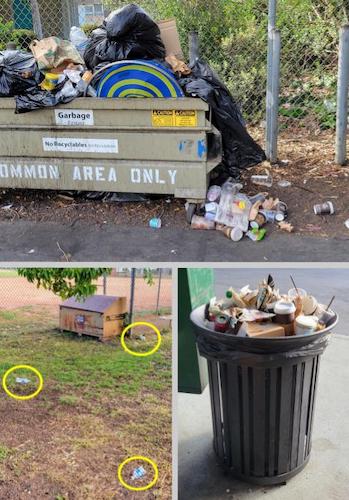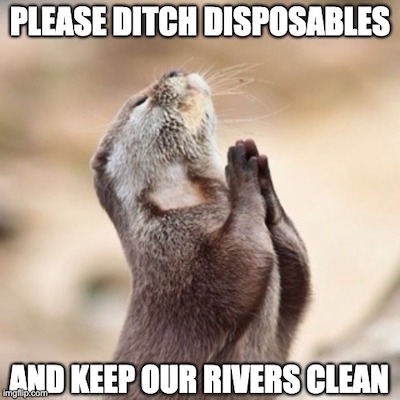We are angry because plastic manufacturers have promoted a myth that plastics can be recycled, encouraging us to continuously buy their single-use disposables when in fact little is being recycled and much of it is damaging our environment. A recent article in The Atlantic, written by a former EPA regional administrator and a chemical engineer, asserts that “Plastic recycling doesn’t work and will never work”. They report that only 5% of post-consumer plastic waste was recycled in the US in 2021. Recycling is too complicated to sort properly (too many incompatible types of plastics), too expensive to process, and often limited in use due to toxin contamination.

Pictures from this morning's dog walk.
Our state knows this, though lawmakers have consistently failed to pass laws to rein in single-use plastics. And our cities know this, with many refusing to take the most difficult to recycle plastics (so-called rigid plastics #3-8). We are drowning in plastic that we don’t know what to do with, and we are surrounded by the visible and disturbing evidence of this.
So, I get why this bothers people. It bothers me too. And yet when people were celebrating Palo Alto’s ban of plastic straws, utensils, and produce bags a few years ago, I cringed. I had tried the compostable produce bags and they were terrible. When I stored my produce in them in the refrigerator, it quickly went bad and the resulting wasted food was its own problem. Nowadays I rarely bother to use them and instead take home loose produce that I store in old bread bags. (1) Apparently I’m not the only one who feels this way. Councilwoman Alison Cormack calls the bags a “disaster” and regrets her vote to replace them.
Similarly, I avoid using paper straws, or really any straws, though I never used them much to begin with. Reader Joseph E. Davis, who seems particularly attached to straws in his drinks, calls the paper versions a “goopy mess” and threatens: “Every time I'm forced to use a goopy mess of a paper straw, my willingness to be subjected to the arrogant micromanagement of climate activists diminishes yet further.”
And that is why I was cringing. In the grand scheme of problems we need to solve, I rank global warming well above plastic waste, given its ability to disrupt and endanger virtually all life around the planet. And while the plastic foodware ban is a start at changing our throwaway culture, do we want to cash out the goodwill that we might have on relatively small and ineffective efforts like this?
Reader BobB expressed a related concern about promoting “solutions” that are inconvenient: “In my opinion, this goes to the root of the problem of gathering support for effective environmental and climate measures. Convenient solutions are the best solutions. We should stop talking about plastic straws and instead talk about what is important and what works.”
I agree with this, but at the same time I worry that it can lead to inaction because convenience isn’t an absolute. We have seen that with mask wearing -- what some take to be a minor inconvenience others view as a big imposition. The same happens when people contemplate flying less, eating less beef, living in less space, or switching to LED lights. In aggregate these would be tremendously impactful changes. But a small change for some is a big hurdle for others. There is a laundry list of inconveniences that can apply in different cases. EVs have inadequate range. Native plants are ugly. Heat pump water heaters are noisy. Reusable cups are a pain to return. Water restrictions turn lawns brown. It costs 10% more. And yet a quickly warming planet with more fires, floods, heatwaves, rising seas, melting permafrost, and intense storms is also not convenient. So what does it mean to avoid the inconvenient?
Our approach has been to avoid mandating the imperfect and instead continue to nudge and persuade and gently suggest, which annoys a whole other set of people who dismiss it as “virtue signaling” because it lacks teeth. If we are lucky, we get price signals or incentives to help push things along. But it will never be the case that prices correctly reflect the externalities, or even that manufacturers are held fully responsible for the waste stream of their products. They have too much influence in our political system and prices are too complicated to set correctly. As just one example, look at how ineffective California’s cap-and-trade has proven to be.

It is true that trying to move too fast results in our moving too slowly because of the opposition that it engenders. But moving too slowly also ends up moving too slowly. What is the right speed that aggravates just the right number of people while moving things ahead as fast as possible?
In my opinion, we need to focus more on opt-outs, particularly for the big-impact items that we must implement to achieve our goals. The sustainable choice should be easy, the default, and other options can be available but less convenient and more expensive. That is how the California building code addresses electrification. You don’t have to fully electrify a new building but it’s a pain not to. We can apply that approach to other things. You want a water heater? The contractor will arrive with a choice of heat pump water heaters on the truck that can be installed that day. You want a heater that burns fossil fuel? Okay, but that will take another day or two to go back and get a waiver to install. What will it be? (2)
Starbucks would hand you a drink in a reusable cup, but you could request a throwaway cup (and it would be called a “throwaway cup”) and pay an extra $0.50 for it. You want a 400-amp panel so you can charge all of your cars at max speed at the same time while also running your dryer and microwave? Sure, but you will need to wait six months and help pay for a transformer upgrade. It would be trivial to lay out grocery stores, plant nurseries, car dealerships, and restaurant menus to encourage adoption of more sustainable options by making them easier to access, if only the owners were motivated.
This is why I’m not so aggravated about the straws and bags any more. Yes, we have bigger fish to fry and yes, these changes will aggravate some people. But they are pretty trivial to get used to or work around. These are not hills that anyone should be dying on. And if you are choosing to die on this hill, then best of luck with the other changes that are coming.
People are generally very adaptable. We should lean into that with opt-out policies, which are extremely effective. As one example, Peninsula Clean Energy offers a 100% renewable and carbon-free option that is $0.01/kWh more than the standard option. Portola Valley voted to make this the default and as a result over 93% of the homes in that town use this option. Neighboring Woodside did not vote to make this the default, and fewer than 3% of homes there use it. Since most people don’t seem to care all that much, we can facilitate their making a more sustainable choice. (3)
Palo Alto is taking this approach as it rolls out a smart meter program. Smart meters will help the city and its residents to better understand and save on electricity use while reducing hazards for meter readers. We are behind much of the rest of the world on these. The city is allowing customers to opt out, but those households will need to read and report on their own meter each month as well as pay a monthly fee for processing these manual reads.
I think we need to be taking this approach with more of our initiatives and be less apologetic about it. Sustainable policies with an inconvenient opt-out should be the rule until we can do even better. The question is, do politicians have the backbone to make this happen?
Notes and References
1. While our stores no longer offer plastic bags in the produce area, I was surprised the other day to find a cashier at Mollie Stone’s efficiently bagging my loose onions in a small white plastic bag from underneath the counter. Maybe there is some kind of underground resistance?
2. Until HPWHs are price-compatible with fossil fuel heaters, contractors answering these calls would need to be able to look up and offer substantial customer rebates to lower-income households.
3. You can find stats for other cities in the table that spans pages 4-5 of this report.
Current Climate Data (April/May 2022)
Global impacts, US impacts, CO2 metric, Climate dashboard
Comment Guidelines
I hope that your contributions will be an important part of this blog. To keep the discussion productive, please adhere to these guidelines or your comment may be edited or removed.
- Avoid disrespectful, disparaging, snide, angry, or ad hominem comments.
- Stay fact-based and refer to reputable sources.
- Stay on topic.
- In general, maintain this as a welcoming space for all readers.



